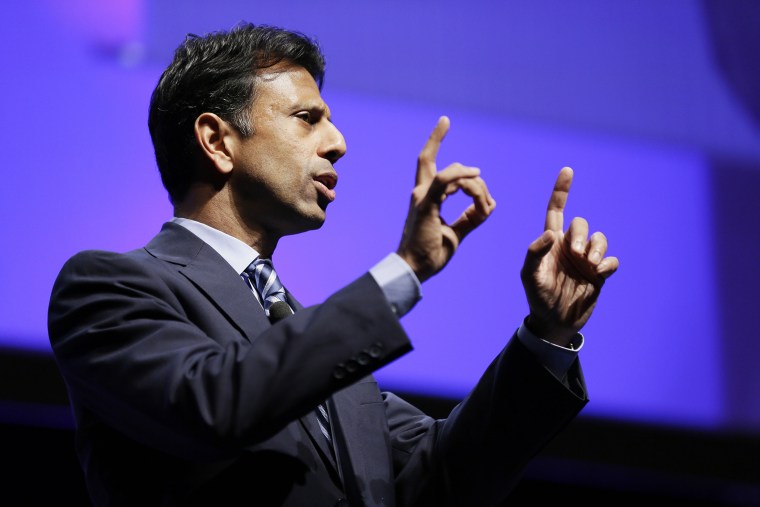Louisiana Gov. Bobby Jindal (R) loved the Common Core education standards. He embraced them, decided to implement them, persuaded his state's education officials to adopt them, and even sought federal funds to incorporate them into Louisiana's curricula.
Then, however, Jindal discovered just how much the Republican Party's far-right base disliked Common Core, at which point the governor (and likely presidential candidate) decided it was time for a reversal: Jindal abandoned the same education policy he'd previously championed.
But apparently, a rhetorical reversal only goes so far. This week, the conservative Republican
went just a little further to demonstrate his opposition to the standards he recently supported.
Louisiana Gov. Bobby Jindal filed a federal lawsuit Wednesday accusing the U.S. Department of Education of illegally coercing states to adopt the Common Core academic standards by requiring states that want to compete for federal grants to embrace the national standards. Jindal also accused the department and Education Secretary Arne Duncan of forcing states to adopt the Common Core standards to win a waiver from some of the restrictive aspects of No Child Left Behind, the federal education law.
The governor now claims Louisiana has been illegally coerced, but as the
Washington Post's report
added, 'When Louisiana applied multiple times for a grant under Obama's Race to the Top program, Jindal never mentioned overreach, illegality or coercion. His state superintendent of education at the time wrote to the U.S. Department of Education "we proudly submit this application to Race to the Top because Louisiana's children can't wait.'"
If Jindal is so opposed to the standards he used to support, why doesn't he just pull out of Common Core altogether? The governor tried that, but state lawmakers wouldn't let him -- Jindal was so persuasive in pitching Common Core on the merits, the legislature, the state education board, and the Jindal Administration's education superintendent all remain Common Core backers.
Of course, none of them are preparing a run for national office and looking for ways to pander to far-right activists.
Lawyers and education policy experts can address the merits of Jindal's case with more authority than I can, but at a distance, it looks like a tough sell. It's states, not the Obama administration, that developed the education standards, and it's states that choose whether or not to adopt them.
The White House supports the standards and makes resources available to states to help support Common Core, but states don't have to take or apply for the money.
It led
Dahlia Lithwick to characterize Jindal's lawsuit as a political "stunt."
Armed with the legal argument of "I saw it first," Jindal seems to be suing on the grounds that he liked Common Core (which sets English and math benchmarks for each grade) before it was cool, and he's mad that the federal government started liking it too. Not really about education or actual federal overreach at all, the suit is little more than a piece of political posturing in the run-up to the 2016 presidential race, a feint to embrace Tea Party suspicions of big federal government programs, even if they were created locally. A PDK/Gallup Poll released last week found that 60 percent of those surveyed don't like the standards and that 76 percent of Republicans oppose them. “People don’t like the federal government telling them what to do,” Hans von Spakovsky, a senior legal fellow at the Heritage Foundation, told the Wall Street Journal on Wednesday. “Folks in the tea party very much think education should be a local concern, and they don’t like the idea of the federal government forcing its national standards.” What better way to distance yourself from an initiative you once supported that the “folks” don’t like, and that a potential political rival still does, than a lawsuit against the much-reviled Department of Education?
As for the larger context, for a party that claims to hate frivolous lawsuits, Republican leaders sure have
become litigious, haven't they?
